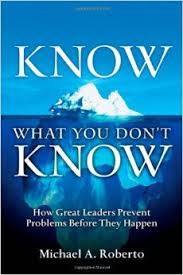The LILA Community explored the Problem Finding Organization. Michael Roberto shared his finding that leaders at all levels must hone their skills as problem-finders to identify and correct problems and prevent catastrophe. To research this point, extensive interviews were conducted with roughly 150 managers of enterprises from private and public sector, often across different levels within the same company. Individuals were asked to describe how they tried to prevent failures from taking place. Roberto identifies seven skills and capabilities necessary to become an effective problem-finder. These are:
1. Circumven t the “gatekeepers” (i.e. those who control filters and other barriers)
t the “gatekeepers” (i.e. those who control filters and other barriers)
2. Become an ethnographer (observe carefully, ask questions, listen intently, etc.)
3. Hunt for patterns (e.g. identify verifiable causal relationships)
4. Connect the dots (i.e. recognize relationships, especially between and among dissimilar elements)
5. Encourage useful failures (i.e. those that are small, brief, inexpensive, and informative)
6. Teach how to talk and, especially, to listen (also when and why)
7. Watch the “game film” of past performance (make adjustments, practice deliberately)
This reminded me of the work that Markus Baer presented during the LILA member webinar describing the issues that experts face in problem formulation. He mentioned that expertise can make it difficult to make sense of things collectively and that expertise impacts collective sense-making. Therefore, he proposed that problem solving may be better thought of as problem formulation. Moving straight to problem solving can create problems; it often works better to focus more energy on formulating the problem.
To read the summary of Michael Roberto book titled: Know What You Don’t Know : How Great Leaders Prevent Problems Before They Happen, click here.
